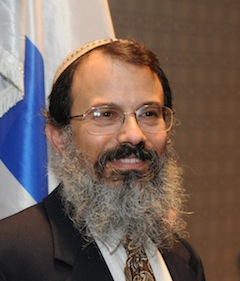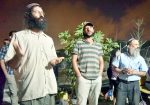Left to right: Ali Abu Awwad, Shaul Judelman and Rabbi Hanan Schlesinger. (photo by hiddensparksphotography.com)
By bringing together Jewish settlers and Palestinian refugees, Roots is trying to help achieve peace.
Rabbi Hanan Schlesinger is one of the leaders of this group, which was established in 2014 by Ali Abu Awwad and Shaul Judelman. In being involved, Schlesinger said he is following in the steps of Rabbi Menachem Froman, who, “for most of his career, for three or four decades, advocated getting Palestinians who we live among to come to a point of dialogue, reconciliation and understanding.
“Froman’s students started a movement called Eretz Shalom, Land of Peace,” explained Schlesinger. “This organization did some activities to bring together Palestinians and Israelis, but really never made it off the ground. When he died, in 2013 … the students who were following in his footsteps, in terms of dialogue connections between Palestinians and Israelis, felt that they had better do something to continue his legacy…. Otherwise, it’s going to be gone.
“Those students, with his widow, in the last week of January 2014, had a little event together with some Palestinians they’d met, which brought together about 15 people from each of the sides. And, 95% of the people there were Israelis and Palestinians who’d met the other side during their lifetime, [were] involved a little bit in reconciliation. The one person there who had never been before was me.”
Schlesinger was deeply affected by the event. He had lived in Gush Etzion for 30 years, and had never met a Palestinian. And, upon meeting some of them, he realized how distorted his idea was of Palestinians.
“I went into a spiritual introspection of revisiting who I was and what I was doing on this land,” Schlesinger told the Independent. “And I forced myself to begin a journey that was leading me to examine many of my core beliefs – realizing it wasn’t just me and my people, that there was another people here who also belong here.
“Without really meaning to, I found myself creating a movement that was embodying this need to open up eyes and hearts, and continue my spiritual process, as well as help others in the spiritual process … that we, the Jews, are not the only ones in this land … that there are other people here and we need to take into account their existence, their humanity, their needs, their suffering.”
Schlesinger met with Palestinians who had been working toward a solution for more than a decade, but only with secular Israelis in Tel Aviv. Until Schlesinger made the connection, they had not sat down with Jewish settlers.
“They’d never met their own neighbours, who are religious Jews, who are deeply connected to the land in a religious, historical sense,” said Schlesinger.
As was the case with Schlesinger, these Palestinians began to undergo a transformation in their understanding. The Israelis with whom they had spoken before then had explained Zionism as of 1948, sometimes as far back as the 1880s. But the secular Israelis had never explained, because, Schlesinger said, they didn’t really know themselves, the ancient Jewish connection to the land – the land from the Jordan to the Mediterranean.
“These Palestinians were getting to know the foundations of Zionism and the Jewish history, culture and religion … just as I was getting to know the fact that there are Palestinians and that they have been living here for many, many years,” said Schlesinger. “Both sides were undergoing revelations.”
Seeing these positive results on a micro-level, with one another, they decided to create a foundation for macro-transformation.

According to Schlesinger, the Oslo Accord did not go far enough. He explained, “It didn’t involve religious Jews or settlers who are deeply connected to the roots of the conflict, the land and history. It marginalized them and swept under the rug, ignoring the roots of the conflict. On the Palestinian side, it didn’t involve observant Muslims. It didn’t involve people deeply connected to the land and history – the people today that they call ‘Hamas.’”
With about a thousand people from each side stepping up and coming to events, Schlesinger understands this is only a drop in the bucket. But, he takes solace in the fact that this is only the beginning.
“Those who do hear of us on both sides, most are critical or skeptical … [seeing us as] ridiculous or traitorous … [because we believe] the other side is worthy to talk to … is human,” said Schlesinger. “It’s really hard going, an uphill struggle. I’ll even say that, especially for our Palestinian partners, it’s particularly challenging. They’re being confronted in their societies and are asking themselves how they can allow themselves to go against the accepted narrative.”
Roots has created different activities with a focus on the youth, keeping in mind the larger goal of transforming Israeli and Palestinian societies.
“For the Palestinians, in their society, ‘dialogue’ is a dirty word,” said Schlesinger. “Dialogue is just a way for the Israelis to buy time before they completely take over their land and destroy them…. Again, their narrative is that Israelis just want to talk and that nothing comes of it.
“When we organize our summer camp and photography workshop, we have to really make it clear to Israelis that the goal is not [only] to get to know the Palestinians. The goal is to get to know them, so that we will have a foundation to bring peace and justice.”
Roots is now working with high school students, where the youth meet three times a month and have joint activities, meals, field trips and conversations about identity, narrative and truth. “This is creating ongoing connections that are powerful,” said Schlesinger.
The group is working to develop political awareness on both sides. They are finding that this aspect is moving much faster on the Palestinian side, as their situation is more dire.
“For the Israelis living here, life is more or less normal,” said Schlesinger. “Every once in awhile, someone is attacked with a knife or a gun and someone may be killed or injured, and that’s a terrible tragedy. But, most people are not killed in terrorist attacks and most don’t have children with relatives killed. Most people have normal lives.
“On the Palestinian side, it’s different. They live under military occupation every single day and they are suffering: suffering from poverty, disenfranchisement and from having their dignity stripped of them.
“I say all that to explain that although on the Israeli side the status quo, is not so bad and most people are willing to live with it … on the Palestinian side, the status quo is insufferable. Our hope is nothing less than peace, justice and reconciliation.”
A documentary has been made about Roots. Called The Fields, it focuses on the founding leaders on both sides – Schlesinger and Judelman on the settlers’ side and Awwad and Khaled Abu Awwad on the Palestinian side. A trailer of it can be watched at friendsofroots.net.
Rebeca Kuropatwa is a Winnipeg freelance writer.

